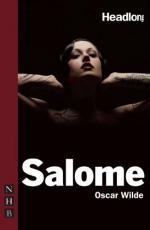|
This section contains 9,841 words (approx. 33 pages at 300 words per page) |

|
SOURCE: Thomas, David Wayne. “The ‘Strange Music’ of Salomé: Oscar Wilde's Rhetoric of Verbal Musicality.” Mosaic (March 2000): 15-38.
In the following essay, Thomas investigates the function of verbal musicality in Wilde's Salomé.
SALOMé:
Thy voice was a censer that scattered strange perfumes, and when I looked on thee I heard a strange music.
—Oscar Wilde, Salomé
In the closing moments of Oscar Wilde's drama Salomé (1893, 1894), the matter of verbal music finds its nearest approach to explicit mention. Having performed her dance of seven veils before the lecherous Herod, Salomé comes to reflect on her dancer's reward—a silver platter bearing the head of the prophet Iokanaan—and she speaks of a “strange music” that had attended, in her imagination, the living presence of the prophet. Alarmed by the new silence, she laments, “There is no sound. I hear nothing” (327-28).1 Fled is that music, indeed, but I suggest...
|
This section contains 9,841 words (approx. 33 pages at 300 words per page) |

|


